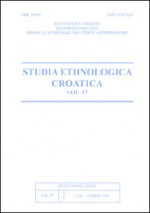Bilješke o narodnom životu u romanima Martina Kukučina
Some Notes on the Folk Life in the Novels of Martin Kukučin
Author(s): Nevena Škrbić AlempijevićSubject(s): Customs / Folklore, Slovak Literature, Cultural Anthropology / Ethnology
Published by: Sveučilište u Zagrebu, Filozofski fakultet
Keywords: Martin Kukučin; construction of a community; literature as ethnographic source;
Summary/Abstract: This article discusses the way and the mode in which fiction can be used as a source of ethnographic data, using the novels of the Slovak writer Martin Kukučin (1860-1928) as a case study. Novels by Kukučin can be used as a source of ethnographic data to Croatian ethnologists because the author spent almost half of his life living among Croats. For thirteen years he lived in the village of Selca on the Island of Brač, while he spent the next fifteen year among the immigrants from the island of Brač in Chile. He based two of his novels on his experiences there: Kuća u strani, which is located in a patriarchal, somewhat idealized rural community on the Island of Brač, and Mati zove, in which he described the life of Croatian, mostly Dalmatian immigration community in the Chilean county of Magellanas. Both novels are filled with descriptions of different segments of traditional culture (notes on traditional economy, clothing, traditional architecture, customs, magical rites, etc.). The importance of folk heritage in the work of Kukučin is emphasized in such a way that his starting points can be compared with the principles which Antun Radić, his contemporary, has introduced into folk research. In creating a model for his literary, fictional societies, the author frequently employs traditional worldviews and concepts, and especially emphasizes the distinctive characteristics which one community carries in relation to Others, as well as the conflicts which exist inside the community itself, between different strata in society. Novels by Kukučin can be interesting for ethnologists for a number of reasons. For example, in Kuća u strani, he describes: cultural differences between different groups inside the village community, between Us and Them, everyday life of village people which Kukučin includes in his novel; the organization of village family, unwritten rules and moral principles followed by the community. In the novel Mati zove he tackles the following issues: integration of Dalmatian immigrants to the apparently homogenized Croatian community in Chile, assignment of collective character and mentality to all the members of a given community. He also includes memories of homeland in the form of ethnographic description, where he emphasizes the notion of the undiminished value of rural heritage; a conflict but also an inter-fusion of two different ways of life seen from the point of view of the immigrants: which elements of their own culture have they preserved in the immigration, which new elements have they adopted in the new country. However, in accepting Kukučin's novels as sources of ethnographic data, we have to bear in mind that they were written by a person whose cultural background was quite different; many paragraphs signify a certain intercession between the two cultures. In his works on Brač and the immigrant Dalmatians, sometimes consciously and sometimes not, he includes data from another traditional culture the one he originated from.
Journal: Studia ethnologica Croatica
- Issue Year: 2004
- Issue No: 16
- Page Range: 141-180
- Page Count: 40
- Language: Croatian

